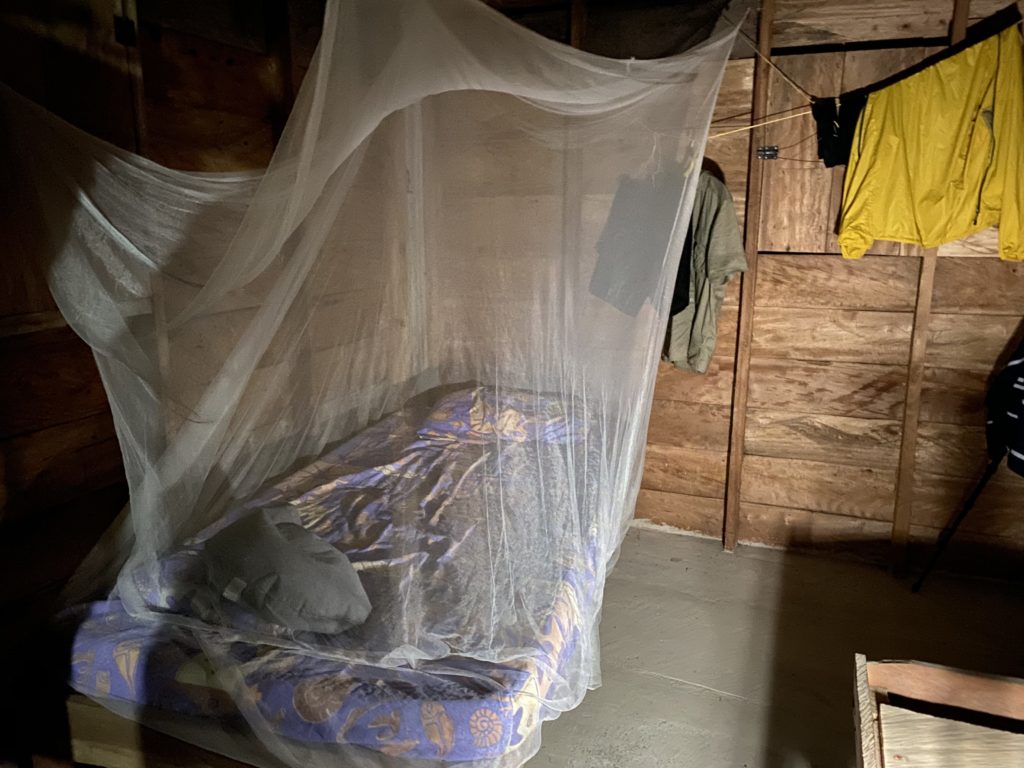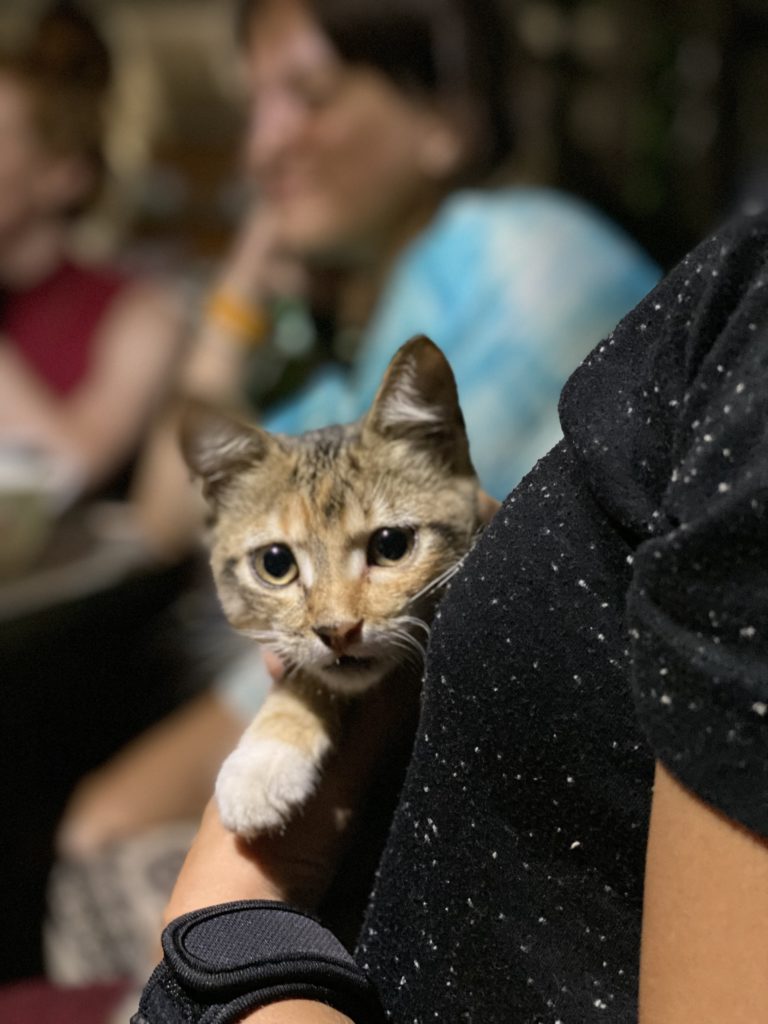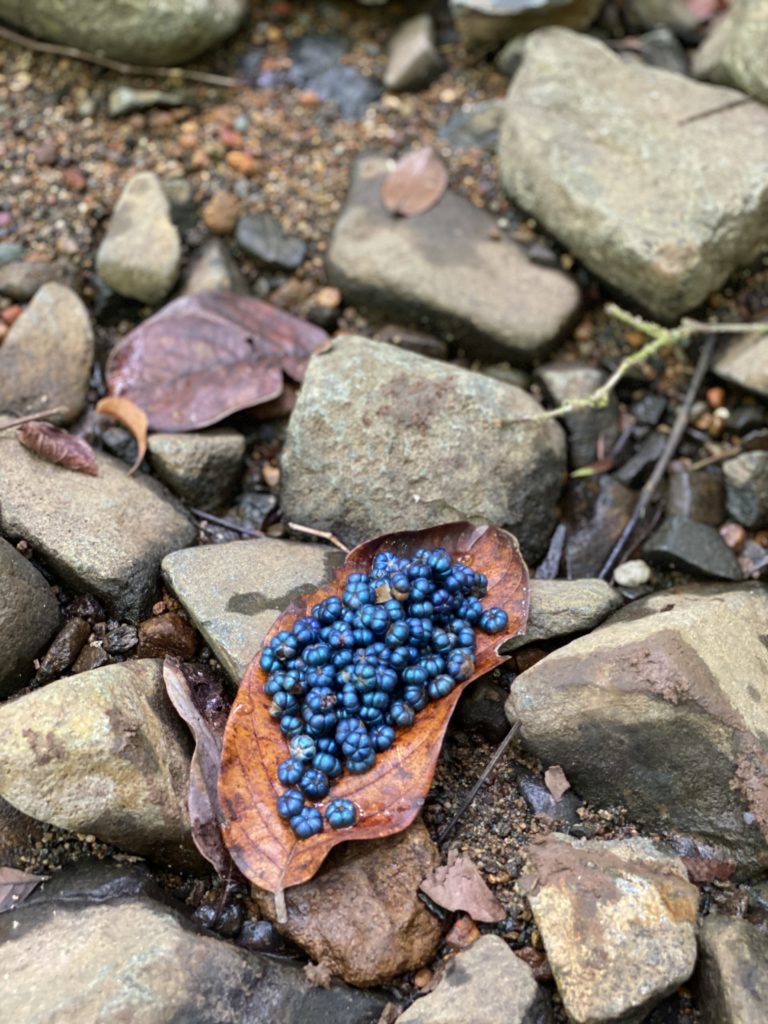I wake up to a clear memory of birds migrating above me in the thousands. Large birds winging so confidently onwards. The ones ahead stop and circle in the sky. Armila is a kind of waypoint to their eventual destination.
In my bed, there might as well be no walls. Everything cuts through: conversations, chickens, even people farting.

I will have been here for a week today. Incredible. It doesn’t seem that way. I don’t feel like it has been a week. Does time pass more quickly here? Or maybe it isn’t about time. We find a different rhythm.
Last night I found myself missing you acutely. Missing our spirited conversations, missing our house and how it is a palace compared to here. But I think this time away is really important for both of us to heal from the loss of Chubs.
Over breakfast, we trade cat stories. Luz talks about how she moved her cat Apollo from Argentina to Germany.

Luis has gone with Nacho to cut plantains on Nacho’s farm. Later he tells us that at one point they were both swimming in the river and Nacho was telling him how there were crocodiles in these parts. And then Nacho disappears! Next thing, Luis feels a tug on his leg from below. He panics, imagining it is a crocodile and Nacho has been taken. But he ducks under to check and there is Nacho, literally pulling his leg. Nacho is 62 but still acts like he’s 16. Such a bundle of energy!
The weather is perfect. If it is the same tomorrow, we will take a day trip to La Miel, the very last point of Panama. The beach is apparently really nice and we can snorkel and even walk over a hill to Sapzurro in Columbia.
The conversation shifts to astrology and tarot. I ask if it is possible to create a deck from the mola symbols. Maria says that it might be better to think about an oracle deck instead. Potential new work!
Palm reading is like thinking about the structure of yourself; the ley lines that run before and after and through us. How do we read ourselves, how do we read others? Luz really is a philosopher. And she is the product of thousands of hours of thinking and talking. Talking is something that we are losing. Devolving things to pithy FB statuses is a broken kind of wisdom, a false dichotomy that reinforces our meaning.

I sacrifice my usual morning of reading and writing to pick lovely blue seeds close to the river in the jungle. It’s a lot less muddy today, so Luz, Maria and I go. Later, Maria collects some clay from the river. She offers to trade my plastic bag for her seeds. A good trade! On the way back, we spy a lovely seed, the serpent’s eye. It is bright red with a black dot in the middle. These are few and far between and it is hard work to gather even a handful of them. I’m probably going to make two separate installation/images with these.
After lunch, we are given access to the private mola collection of Gladys and Aida. Gladys is Nacho’s wife, and Aida is his daughter-in-law. They unleash a barrage of mola in all shapes and sizes. I get one that I make into a tote bag and another small pouch. I also decide to make a shirt that is used for formal occasions. There will be some mola patterns on the sleeves and collar. It’ll cost about $37 USD with the fabric and sewing. It won’t be ready for the chicha ceremony next week, but I should be able to get it before I leave.
This occupies us all the way to the lecture, where Nacho regales us with two tales, or myths. One is the origin of everything, the creation myth, so to speak, and the other is a folk tale that carries a moral warning. It involves a man, a mole and a journey to the centre of the earth. And a lot of jealousy.
Origin story (or, it’s all about the chicha)
In the beginning, when God sent beings to the earth, the earth was covered entirely in soil. These beings were animals with human characteristics; higher intelligence, conscience, speech.
The tiger was the leader of all the beings. Everyone worked in harmony but the butterfly was a being who always seemed happier than the others. Apparently, she had visions! Tiger and the other beings held a meeting to try to discover her secret. They decided to follow her. In the village, where they lived, there was an enormous tree whose branches touched the clouds. So the butterfly flew high, beyond sight of the other beings. So they waited for her. When the butterfly came down, she was in a state of bliss, a state of grace. Tiger and the rest decided the only way to find out where she went was to chop down the tree.
So they started to chop. All day with machetes. But the next day, the tree was whole, as if nothing had happened. The same thing happened the next day. So the beings stayed up all night to watch the tree. They realised that the tree was crying, and the tears (the sap) of the tree began to regenerate its wounds.
That is how the Guna explain botany. Nacho once had a machete cut and he used tree sap to salve the wound it was enough.
Nevertheless the beings decided to chop the tree all the way thorough. Finally, they succeeded and the tree started to fall. Then it stopped. It branches were stuck in the clouds. Tiger thought that they had to cut the clouds so that the tree would fall. But nobody wanted to go. Finally, Tiger offered his daughter’s hand in marriage to the being who would cut the clouds. A squirrel volunteered and he managed to cut the clouds. The tree fell to the found and he had the tiger’s daughter in marriage, as promised.
When the tree fell, they found that at the very top of the tree, God had put the seeds of every plant in the world. And when the tree fell, the force of its fall flung seeds throughout the world. And its fallen branches became the trees of the Earth. The impact of the falling tree made the oceans.
Most importantly, the beings discovered fermented sugarcane at the top of the tree, which was what the butterfly was getting high on. And that was how chicha was discovered.
The name of the tree was Baluala (the tree of life). But the animal beings didn’t believe in God, so God sent humans to earth to dominate the animals because the animals were causing chaos by doing whatever they wanted. Humans were the representative of creator God. In a kind of parallel Babel, God stripped the animals from having human characteristics, establishing a hierarchy of dominance on earth.
A Mole Story
Before the arrival of the humans, animals held all the secrets of the world. When the humans came, they asked to know what was going on. They were keen to find out what was happening in the centre of the earth. That was difficult indeed, according to the mole. He told the humans that at the door of to the centre of the earth there were many beautiful women. But humans were not allowed to look or speak to them. Then there will be two jaguars, but human, you don’t have to worry because you’re with me.
So why did the mole bring the human? The mole told the human that in the centre of earth, there is a special kind of plantain that will produce food forever. The only way to there is with the mole but only the human can gather the seeds. So they had to go together. The seed was important because it would produce the plantain fruit and the mole wanted to give this to the humans.
So they started on their journey. They passed the first test. And the second. They arrived at the plantain tree. But in order to gather all of the seeds, they had to make four trips in total. Back in the community after the first trip, the human told the rest of his people what he had to do. But after they had made three trips, people decided that he had gone enough times and were jealous. They wanted someone else to get a chance to go. Their jealousy won out in the end and another human was chosen. But he hadn’t been warned of the dangers, so he looked at the beautiful women and he became blind, and then he was so afraid of the jaguars that he lost all power of speech and died. Four people died in this way. And that is why, to this day, humans have never been able to get the eternal plantain.
What is the moral of the story?
Plantains are a staple part of the Guna diet, but jealousy is a limitation to making life easier for everyone. Sahilars use this mythology as an analogy to solve issues in the community.
The lack of being connected to the Internet has led me to the realisation that everything I know I hold inside me. And everything I have allowed to let go or simply choose to forget is out of reach, inaccessible. If I remember half a story, that’s all I have. No facts to check, no ideas to confirm, no music recommendations to play. The stream is the one that’s a twenty-minute walk from the village. The cloud holds sunshine and sometimes rain. The net bulges heavy from the day’s catch. I search for seeds and coconut husks on the ground. Here in the engine of my hours, I fuel my desires by making, by taking, by working.
Washing clothes takes on new meaning here. The Guna are really big on washing clothes. They do have large households, but it is a marvel to see the lines of washing hung up every single day. If they run out of space they throw them onto their thatch roofs. I am reminded of how much work it takes when I do my own laundry. Maria remarked how the word for a washing machine in Iceland is taike, which derives from take and the sense that machines take work from you, but by hand-washing your clothes, you take that work back, redeem it, almost.

Random notes over dinner:
Death is figured male and female in different languages. Maybe we see whom we want to see at the moment of our passing
Caroline offers that being psychic is like having polaroids stuck to somebody. You see bits and pieces of a life.
Luis recollects that to celebrate tortaso is to have your face smashed into your birthday cake when you are about to blow out the candles. When you grow up it is about taking a big bite with your whole face. After a few years of this, Luis began to ask for a plate of fries instead of a cake.

